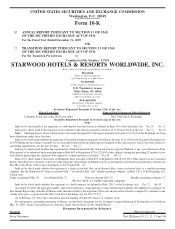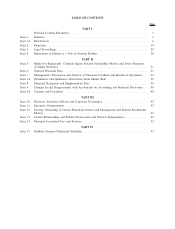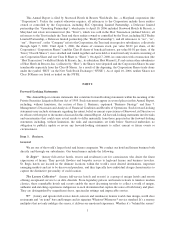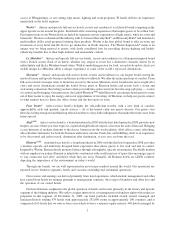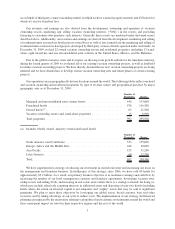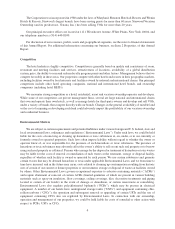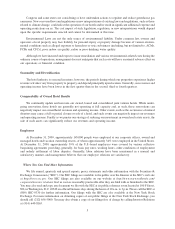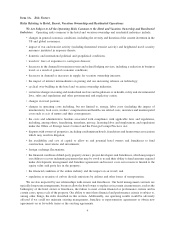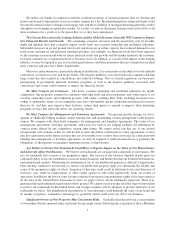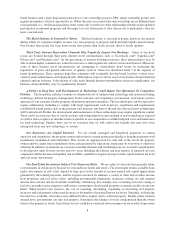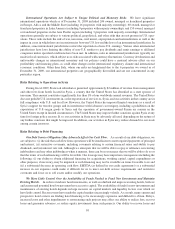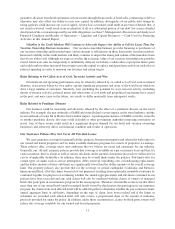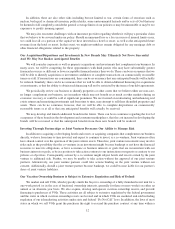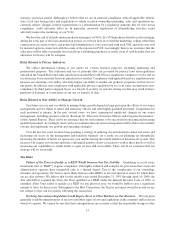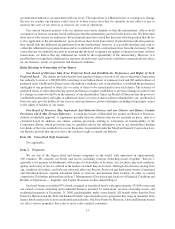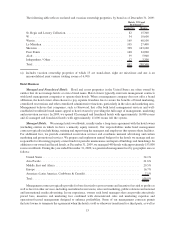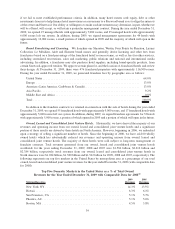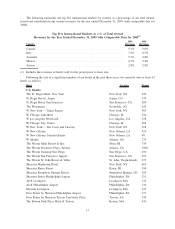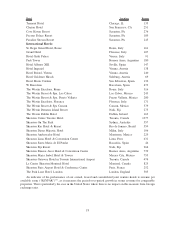Starwood 2009 Annual Report Download - page 83
Download and view the complete annual report
Please find page 83 of the 2009 Starwood annual report below. You can navigate through the pages in the report by either clicking on the pages listed below, or by using the keyword search tool below to find specific information within the annual report.brand business and a large disposition transaction to one ownership group in 2006, single ownership groups own
significant numbers of hotels operated by us. While the risks associated with such ownership are no different than
exist generally (i.e., the financial position of the owner, the overall state of the relationship with the owner and their
participation in optional programs and the impact on cost efficiencies if they choose not to participate), they are
more concentrated.
The Hotel Industry Is Seasonal in Nature. The hotel industry is seasonal in nature; however, the periods
during which we experience higher revenue vary from property to property and depend principally upon location.
Our revenue historically has been lower in the first quarter than in the second, third or fourth quarters.
Third Party Internet Reservation Channels May Negatively Impact Our Bookings. Some of our hotel
rooms are booked through third party internet travel intermediaries such as Travelocity.com», Expedia.com»
Orbitz.com»and Priceline.com». As the percentage of internet bookings increases, these intermediaries may be
able to obtain higher commissions, reduced room rates or other significant contract concessions from us. Moreover,
some of these internet travel intermediaries are attempting to commoditize hotel rooms by increasing the
importance of price and general indicators of quality (such as “three-star downtown hotel”) at the expense of
brand identification. These agencies hope that consumers will eventually develop brand loyalties to their reser-
vations system rather than to our lodging brands. Although we expect to derive most of our business from traditional
channels and our websites, if the amount of sales made through internet intermediaries increases significantly, our
business and profitability may be significantly harmed.
A Failure to Keep Pace with Developments in Technology Could Impair Our Operations Or Competitive
Position. The hospitality industry continues to demand the use of sophisticated technology and systems including
technology utilized for property management, brand assurance and compliance, procurement, reservation systems,
operation of our customer loyalty program, distribution and guest amenities. These technologies can be expected to
require refinements, including to comply with legal requirements such as privacy regulations and requirements
established by third parties such as the payment card industry, and there is the risk that advanced new technologies
will be introduced. Further, the development and maintenance of these technologies may require significant capital.
There can be no assurance that as various systems and technologies become outdated or new technology is required
we will be able to replace or introduce them as quickly as our competition or within budgeted costs and timeframes
for such technology. Further, there can be no assurance that we will achieve the benefits that may have been
anticipated from any new technology or system.
Our Businesses Are Capital Intensive. For our owned, managed and franchised properties to remain
attractive and competitive, the property owners and we have to spend money periodically to keep the properties well
maintained, modernized and refurbished. This creates an ongoing need for cash and, to the extent the property
owners and we cannot fund expenditures from cash generated by operations, funds must be borrowed or otherwise
obtained. In addition, to maintain our vacation ownership business and residential projects, we need to spend money
to develop new units. Events over the past two years including the failures and near failures of financial services
companies and the decrease in liquidity and available capital have negatively impacted the capital markets for hotel
and real estate investments.
Our Real Estate Investments Subject Us to Numerous Risks. We are subject to the risks that generally relate
to investments in real property because we own and lease hotels and resorts. The investment returns available from
equity investments in real estate depend in large part on the amount of income earned and capital appreciation
generated by the related properties, and the expenses incurred. In addition, a variety of other factors affect income
from properties and real estate values, including governmental regulations, insurance, zoning, tax and eminent
domain laws, interest rate levels and the availability of financing. For example, new or existing real estate zoning or
tax laws can make it more expensive and/or time-consuming to develop real property or expand, modify or renovate
hotels. When interest rates increase, the cost of acquiring, developing, expanding or renovating real property
increases and real property values may decrease as the number of potential buyers decreases. Similarly, as financing
becomes less available, it becomes more difficult both to acquire and to sell real property. Finally, under eminent
domain laws, governments can take real property. Sometimes this taking is for less compensation than the owner
believes the property is worth. Any of these factors could have a material adverse impact on our results of operations
8



